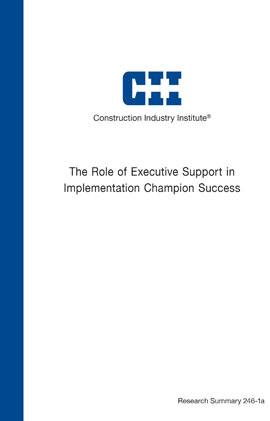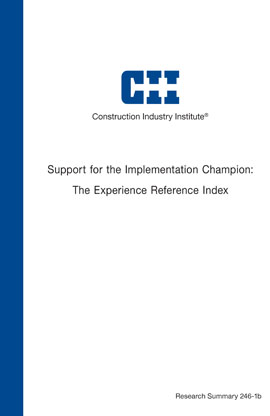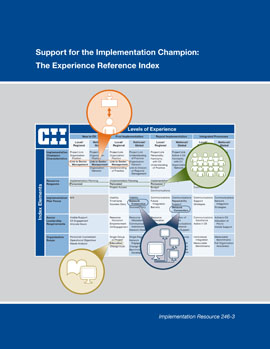
The Role of Executive Support in Implementation Champion Success
The success of a new implementation process relies on two critical organizational elements:
- an implementation champion (IC) who has the primary responsibility of introducing new practices to benefit the organization, and who also offers technical support, administrative contact, management oversight, and general process support.
- the Board of Advisors (BOA) member who in the case of CII member organizations is the direct link to management, and who facilitates the IC’s ability to successfully deliver the anticipated results.
[While this study focused on CII member organizations, the dynamics between the executive sponsor and implementation champion exist, in similar fashion, within non-CII member organizations when introducing organizational change.]
This research addresses the question, if the required IC support is being provided and if there is a gap between the BOA and IC perspectives, can the desired end results be achieved?
This research studied the IC’s role in several major areas, including organizational support, barriers, and success measures. Of particular interest was the alignment of the ICs and the BOA members on these areas within the organizations studied. The research indicates that both IC and BOA respondents believe that
- an IC enters an implementation process with little authority and with unenthusiastic support from management.
- few organizations have defined success metrics to judge the success of an implementation effort.
Their perspectives diverge with respect to the barriers to implementation they perceive. In this regard, BOA members believe the primary barrier to implementation success is personnel-based while ICs believe budget and risk play a pronounced role in the approval process. It is the presence of these kinds of discrepancies that challenges the success potential for implementation efforts. This research highlights the need for organizations to reconsider the roles undertaken by individuals in successful implementation efforts. It also asks organizations that are serious about improvement to reexamine the requirements for supporting ICs as they carry out their implementation responsibilities.
- Adequate Time - had little designated time to perform IC tasks
- Adequate Support - believed that minimal support was provided by management for new practice implementation
- Adequate Visibility - enjoyed little visibility for implementation efforts
- Implementation Difficulty - encountered difficulties at various organizational levels during the implementation effort
- Primary Barriers - encountered barriers that were primarily cultural and organizational rather than technical
- Level of Success - believed they were only moderately effective in their IC responsibilities



